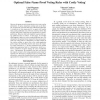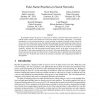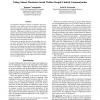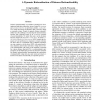28 search results - page 1 / 6 » Optimal False-Name-Proof Voting Rules with Costly Voting |
AAAI
2008
13 years 7 months ago
2008
One way for agents to reach a joint decision is to vote over the alternatives. In open, anonymous settings such as the Internet, an agent can vote more than once without being det...
WINE
2010
Springer
13 years 2 months ago
2010
Springer
In mechanism design, the goal is to create rules for making a decision based on the preferences of multiple parties (agents), while taking into account that agents may behave stra...
AAAI
2010
13 years 6 months ago
2010
In cooperative multiagent systems an alternative that maximizes the social welfare--the sum of utilities--can only be selected if each agent reports its full utility function. Thi...
ALDT
2011
Springer
12 years 4 months ago
2011
Springer
A variety of preference aggregation schemes and voting rules have been developed in social choice to support group decision making. However, the requirement that participants provi...
AAAI
2012
11 years 7 months ago
2012
Distance rationalizability is an intuitive paradigm for developing and studying voting rules: given a notion of consensus and a distance function on preference profiles, a ration...




